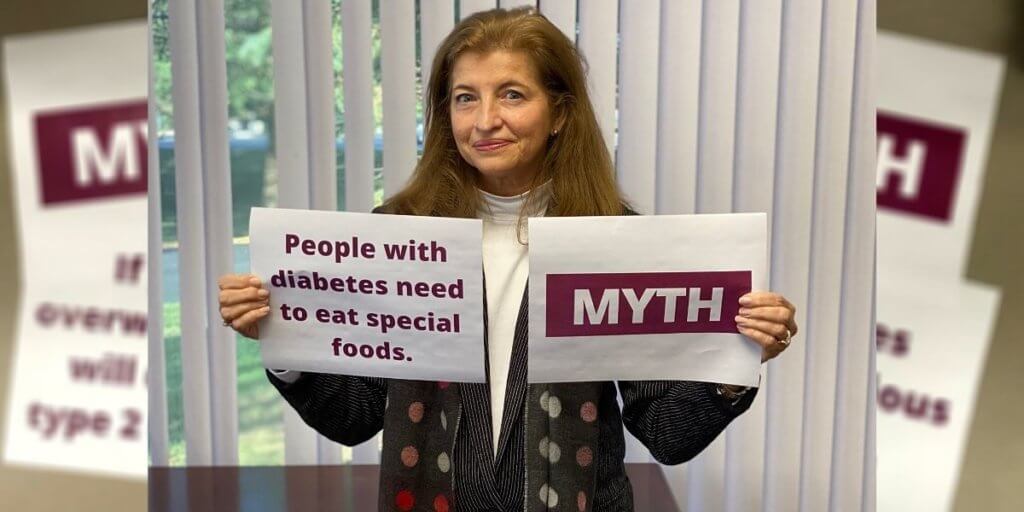
November is American Diabetes Month. Of course, raising awareness about preventing diabetes is essential, but focusing on proper treatment is just as crucial for those living with the disease. Myths and misconceptions about diabetes often lead people to make bad care decisions based on false information.
Meet Our Myth Debunker, Lisbeth Irish, RDN, CDN, CDCES
Lisbeth Irish is a Registered Dietitian Nutritionist, Certified Dietitian Nutritionist, and a Certified Diabetes Care and Education Specialist. Originally from Columbus, Ohio, Lisbeth earned her Bachelor of Science degree from the State University of New York at Oneonta. She has experience working as a Registered Dietitian for Albany County Department for Aging. She is a member of the American Academy of Nutrition and Dietetics and its Diabetes Educator Practice Group, and the New York State Academy of Nutrition and Dietetics. Her areas of particular interest include pregnancy and gestational diabetes.
Myth: If you're overweight, you will develop type 2 diabetes.
A lot of people believe weight is the only risk factor for type 2 diabetes; however, many people who have type 2 diabetes are at an average weight or only moderately overweight. Lisbeth says, "Being overweight will not cause Type 2 diabetes. Extra weight may be a factor contributing to its onset if you have other risk factors." Yes, overweight is a risk factor, but other factors like how much exercise you get, your family history and ethnicity, and your age also play a role in your risk.
Myth: Sugary drinks cause diabetes.
Research has shown that drinking sugary drinks is linked to type 2 diabetes but is not the immediate cause. Lisbeth says, "Sugary drinks can contribute extra calories, which increases your weight, and this could be a risk factor in developing type 2 diabetes. But the sugary beverages do not cause diabetes." According to the American Diabetes Association, people should avoid drinking sugar-sweetened beverages in order to help prevent type 2 diabetes.
Myth: Diabetes isn't a serious disease.
YES, diabetes IS a serious disease. Lisbeth says, "Diabetes can result in damage to many organ systems (heart, kidneys, eyes, nerves, etc.) if it is not well controlled." Diabetes has caused more deaths per year than breast cancer and AIDS combined. On the bright side, managing your diabetes can reduce your risk of diabetes complications.
Myth: People with diabetes need to eat special foods.
A healthy diet for someone with diabetes is generally the same as a healthy diet for anyone else. Lisbeth says, "It is important to learn how to manage your diet if you have diabetes, but there are no special foods required." Foods low in saturated fat, moderate in salt and sugar, meals based on lean protein, non-starchy vegetables, whole grains, healthy fats, and fruit are typical for anyone looking for a healthy meal plan. Foods that say they are more beneficial for people with diabetes generally offer no unique advantage.
Myth: If you're prescribed insulin, it means you're failing to take care of your diabetes.
Having to use insulin to get your blood glucose levels to a healthy level is a good thing, not a bad one. Lisbeth says, "Sometimes we need to take insulin when the pancreas fails to make enough. It's not necessarily due to what we are doing or not doing." For most, type 2 diabetes is a progressive disease. Many people with type 2 diabetes, when first diagnosed, can keep their blood glucose at a healthy level when combined with a healthy meal plan, regular physical activity, and oral medications. But as time goes on, the body gradually produces less and less of its own insulin, and then eventually, oral medications may not be enough to keep blood glucose levels in a healthy range.
Myth: You should not eat carbohydrates if you have diabetes.
Someone with diabetes can still eat bread, cereals, pasta, rice (whole grain options are better), and starchy vegetables in everyday meals and snacks. Starchy foods can be part of your healthy meal plan, but remember, portion size is key. Lisbeth says, "Your body relies on carbohydrates as its primary fuel source. People with diabetes need to learn how to manage the carbohydrate they eat. Not eliminate it."
Within our Patient Education and Wellness Program, our Diabetes Self-Management Education and Support services are taught by our team of Diabetes Care and Education Specialists. They will teach you the knowledge and skills necessary for optimal diabetes self-care while incorporating your needs, goals, and life experiences. For more information or to make an appointment, please call (518) 713-5347.
Source
https://www.diabetes.org/diabetes-risk/prediabetes/myths-about-diabetes
